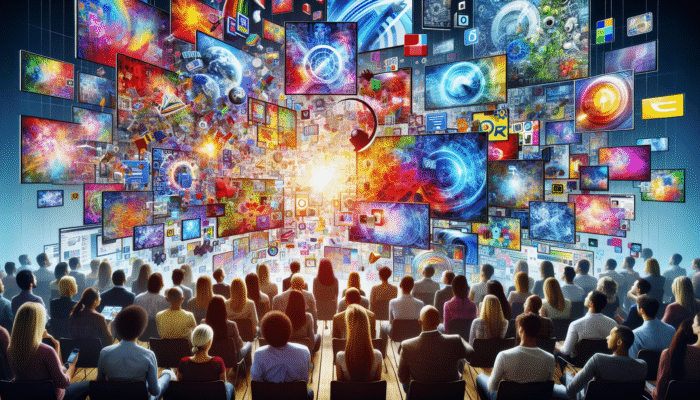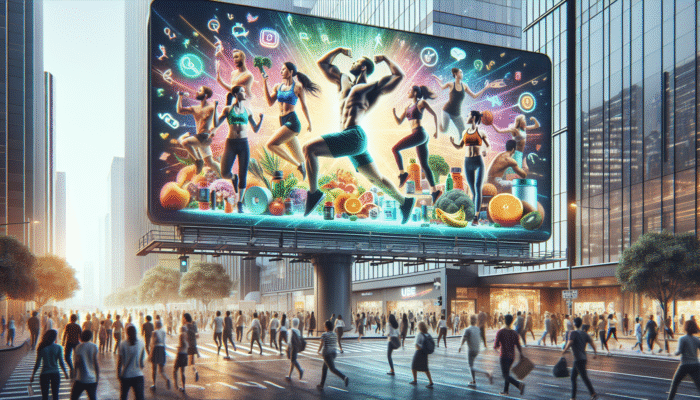Discover the Comprehensive Range of Services Offered by a Leading Media Marketing Agency
Utilising Effective Digital Advertising Strategies to Maximise Brand Impact

In the fast-paced world of digital marketing, where consumer attention spans are rapidly declining, it is crucial to adopt an all-encompassing strategy for digital advertising. This approach significantly enhances a brand's visibility and strengthens its market presence. A top-tier media marketing agency meticulously crafts digital ad campaigns that are not only visually striking but also strategically optimised for distribution across a multitude of platforms, thereby ensuring maximum engagement with the intended audience. This multifaceted approach employs popular social media channels, search engines, and display networks, guaranteeing that your brand's message reaches the right audience at the most advantageous time.
Imagine launching a global campaign during a major event like the FIFA World Cup, where advertisements flood social media feeds and dominate search engine results. The significant visibility gained during such high-traffic periods can lead to substantial increases in brand recognition and enhanced customer engagement. A robust digital advertising strategy leverages demographic insights to ensure that advertisements resonate deeply with potential customers' interests and behaviours, ultimately driving higher conversion rates and boosting sales figures.
By harnessing the power of data analytics, these campaigns can be dynamically adjusted in real time. This agile strategy ensures that if any advertisement falls short of performance benchmarks, rapid modifications can be enacted. An effective digital advertising strategy not only amplifies visibility but also cultivates trust and credibility—two vital components for any brand striving to flourish in a competitive landscape.
Innovative Content Creation to Enhance Brand Communication
Content is the lifeblood of any effective marketing strategy, infusing energy into a brand's identity while actively engaging its audience. A premier media marketing agency excels in generating captivating content tailored for various platforms, including blogs, videos, infographics, and podcasts. The objective is to create materials that not only inform but also resonate emotionally with the audience, igniting a desire for action and ongoing engagement.
Consider the diverse applications of content. For instance, a travel agency might produce immersive blog posts filled with stunning visuals that spotlight exotic destinations. This approach not only provides intrinsic value for the reader but also positions the brand as a trusted authority within the travel sector. By integrating storytelling into content creation, brands can establish deeper connections with their audience, significantly enhancing the likelihood of engagement and conversion.
Moreover, the ascent of video content cannot be overlooked. Platforms such as YouTube and TikTok have revolutionised how audiences consume information, placing greater emphasis on captivating visual narratives rather than traditional formats. A leading media marketing agency that embraces a variety of content formats will distinguish itself, effectively capturing attention across global markets while driving substantial brand growth.
Strategic Management of Social Media to Boost Brand Visibility
With billions of users engaging across diverse social media platforms, the proficient management of a brand's social media presence is vital. A premier media marketing agency provides strategic social media management that extends beyond mere posting. This includes proactive audience engagement, timely responses to comments, and the cultivation of a vibrant community surrounding the brand.
By mastering the intricacies of each platform, from Instagram's visual-centric engagement to LinkedIn's professional networking, these agencies can tailor their strategies to foster brand loyalty and broaden outreach. Campaigns can be crafted to promote brand events, product launches, or social initiatives, leveraging trending topics to amplify visibility.
Furthermore, analysing social media performance yields critical insights into audience preferences, empowering brands to refine their strategies effectively. This continuous engagement and adaptability are paramount for nurturing a loyal customer base, which is essential for sustained success in today’s marketplace.
Comprehensive SEO Strategies to Enhance Online Visibility

In the expansive digital landscape, achieving visibility necessitates a strategic approach to search engine optimisation (SEO). A skilled media marketing agency implements extensive SEO strategies aimed at elevating a brand's visibility in search engine results. This process includes thorough keyword research, content optimisation, and technical enhancements to ensure that your website ranks higher, thereby attracting organic traffic effectively.
An impactful SEO strategy transcends mere keyword focus; it encompasses the overall user experience. This involves optimising website speed, ensuring mobile responsiveness, and producing engaging content that satisfactorily addresses user inquiries and concerns. For example, a brand committed to sustainability might optimise its website with keywords that reflect eco-conscious values, appealing to a global audience eager for sustainable solutions.
By employing analytics tools, these agencies can monitor performance and adjust strategies based on real-time data. This allows for continual refinement, ensuring that the brand remains competitive and relevant in an ever-evolving digital landscape.
Targeted Email Marketing Campaigns to Boost Customer Engagement
Despite the surge of social media, email marketing continues to be one of the most powerful tools in a marketer’s toolkit. A proficient media marketing agency designs and executes targeted email campaigns that nurture leads, keep customers informed, and build enduring relationships. These campaigns can be personalised, addressing recipients by name and customising content based on their interactions with the brand.
Through strategic segmentation, brands can dispatch tailored messages to various audience groups, ensuring that the content is timely and relevant. For example, a fashion retailer might send promotional emails featuring seasonal collections to previous customers, encouraging repeat purchases. By meticulously monitoring open and click-through rates, these agencies can refine their strategies to enhance engagement and drive conversions.
Additionally, the utilisation of automation tools facilitates timely follow-ups, reminders, and personalised recommendations. This methodology not only enhances customer retention but also creates a seamless experience that resonates with audiences globally, fostering long-term loyalty.
Effective Strategies for Achieving Marketing Success
Designing Targeted Campaigns that Resonate with Audiences

Creating campaigns that genuinely resonate with audiences begins with a profound understanding of their specific needs and preferences. A top-tier media marketing agency excels in crafting targeted campaigns that speak directly to these demographics, ensuring optimal effectiveness. By conducting extensive market research and leveraging data analytics, these agencies can pinpoint key audience segments and tailor their messaging to align with their interests.
For instance, a global health brand may initiate a campaign specifically aimed at fitness enthusiasts, highlighting the benefits of a new supplement. By utilising platforms frequented by this audience, such as fitness blogs and Instagram influencers, the campaign can effectively engage potential customers. This targeted approach not only heightens the chances of engagement but also bolsters brand loyalty, as consumers feel understood and valued.
Moreover, timing is critical for campaign success. Aligning marketing initiatives with significant events, such as holidays or cultural celebrations, can amplify the message's reach. By tapping into the existing excitement and sentiment surrounding these occasions, brands can create campaigns that are memorable and impactful.
Making Informed, Data-Driven Marketing Decisions
In an era defined by abundant data, effectively leveraging insights can profoundly influence a brand’s success trajectory. A proficient media marketing agency adopts a data-driven methodology, utilising analytics to inform marketing decisions and optimise performance. This approach includes tracking key performance indicators (KPIs), analysing audience behaviour, and adapting strategies based on real-time insights.
For example, if a campaign is not yielding desired results, data analysis can pinpoint specific areas for improvement, whether it pertains to platform selection or messaging strategies. Brands that harness this information can pivot quickly, making informed decisions that enhance their marketing effectiveness and optimise budget allocation.
Additionally, A/B testing serves as a powerful component of this strategy, allowing brands to experiment with different methodologies to determine which resonates most effectively with their audience. By continuously refining strategies based on empirical evidence, companies can cultivate a more effective marketing ecosystem, driving growth and engagement.
Commitment to Continuous Improvement in Marketing Excellence
The path to marketing success is never static; it requires ongoing refinement and adaptation. A dedicated media marketing agency prioritises continuous improvement, consistently analysing performance metrics to ensure sustained success. This iterative process involves reviewing previous campaigns to identify effective strategies and areas for enhancement, applying those lessons to future efforts.
By fostering a culture of feedback and adaptability, brands can maintain their relevance in a rapidly changing market. This may involve adopting new technologies, shifting towards emerging social media platforms, or even tapping into current trends that resonate with the audience.
A commitment to continuous improvement not only enhances performance but also cultivates trust with consumers. When a brand demonstrates its willingness to listen and adapt, it fosters a loyal customer base that appreciates its responsiveness and dedication to quality service.
Client Success Stories: Illustrative Examples of Marketing Excellence
Case Study 1: Transforming a Tech Startup's Market Position
An impressive success story features an emerging tech startup that achieved remarkable results through the strategies of a media marketing agency. Faced with intense competition in the smart home market, they aimed to bolster their market share. The company executed targeted digital advertising and engaging content creation, launching a captivating campaign that showcased the unique features of their innovative products.
Through a series of expertly crafted social media ads and insightful blog posts, the startup generated considerable buzz. They employed data-driven decisions to optimise their campaigns in real time, resulting in an extraordinary 40% increase in website traffic within just three months.
This case exemplifies the potential of focused strategies in enhancing a brand's presence within a saturated marketplace. By leveraging a combination of compelling content and precise targeting, the startup not only expanded its market share but also solidified its reputation as a credible player in the tech industry.
Case Study 2: Elevating a Renowned Hospitality Brand's Marketing Efforts
Another notable success story involves a prestigious hospitality brand seeking to enhance its marketing capabilities. By collaborating with a media marketing agency, the brand embraced a holistic approach integrating SEO optimisation, social media management, and email marketing.
The outcomes were remarkable. Within six months, their search engine rankings improved significantly, resulting in a substantial increase in direct bookings. The email campaigns not only nurtured existing customers but also incentivised their return, while engaging social media content showcased stunning visuals of their properties, captivating potential guests.
This well-rounded strategy not only fulfilled the brand's marketing objectives but also deepened customer engagement. By creating a cohesive narrative across multiple channels, the hospitality brand successfully solidified its market position and attracted a diverse clientele from around the globe.
Case Study 3: Innovative Marketing Solutions for a Fashion Retailer
Lastly, a fashion retailer experienced transformative growth by implementing groundbreaking marketing strategies. Partnering with a media marketing agency, they integrated cutting-edge technologies, such as augmented reality (AR), to enrich the customer experience. This initiative allowed consumers to virtually try on outfits before making a purchase, creating an interactive shopping journey.
The success of the campaign was reflected in a significant increase in online sales, with customers reporting heightened satisfaction levels. The incorporation of AR technology not only enhanced the shopping experience but also garnered considerable media attention, significantly elevating brand recognition.
This case underscores the importance of embracing innovation in marketing. By integrating advanced technologies and tailoring experiences to meet consumer expectations, brands can achieve substantial growth and increased visibility in a competitive landscape.
Harnessing Innovative Technologies for Marketing Success
Utilising AI and Machine Learning for Predictive Marketing Strategies
Artificial intelligence (AI) and machine learning have transcended mere buzzwords; they are transformative tools that have redefined the marketing landscape. A media marketing agency leverages these technologies to anticipate consumer trends and effectively personalise marketing initiatives. By analysing extensive datasets, AI can identify patterns in consumer behaviour, enabling brands to tailor their messaging and offerings accordingly.
For instance, AI algorithms can ascertain which products are likely to resonate with individual customers based on their previous purchases and preferences. This level of personalisation not only enriches the customer experience but also enhances the likelihood of conversions. Brands adopting AI-driven strategies can stay ahead of the competition by quickly adapting to changes in market conditions and consumer preferences.
Furthermore, machine learning algorithms continuously refine their capabilities, learning from each interaction and enhancing their predictive accuracy. This ensures that marketing strategies remain relevant and effective, driving engagement and fostering customer loyalty over time.
Utilising Advanced Analytics for Empowered Marketing Strategies
In the realm of marketing, knowledge equates to power. Advanced analytics tools provide invaluable insights into consumer behaviour, equipping brands to make informed decisions. A media marketing agency employs these tools to track performance metrics, segment audiences, and optimise campaign effectiveness.
By harnessing predictive analytics, brands can forecast future trends and consumer demands, ensuring they remain ahead of the curve. For instance, a retailer might analyse historical sales data to predict which products will be in demand during a specific season. This foresight can guide inventory management and marketing strategies, positioning the brand favourably to meet consumer expectations effectively.
Moreover, advanced analytics facilitate A/B testing and optimisation, enabling brands to experiment with various approaches and refine their tactics based on real-time results. This iterative process promotes continuous improvement, enhancing the overall efficacy of marketing efforts.
Creating Immersive Experiences through Virtual Reality
Virtual reality (VR) is emerging as a transformative force in marketing, offering immersive experiences that captivate audiences. A media marketing agency can leverage VR to develop engaging campaigns that transport consumers into a brand's universe. For instance, a real estate company might provide virtual tours of properties, allowing potential buyers to explore homes from the comfort of their own living rooms.
This immersive approach not only enriches the customer experience but also creates a deeper emotional connection with the brand. By providing an engaging and interactive way to experience products or services, brands can cultivate loyalty and encourage repeat business.
Additionally, VR has applications for training and internal marketing purposes, enabling employees to interact with products in a simulated environment. As technology progresses, the incorporation of VR into marketing strategies will become increasingly vital for capturing consumer attention and driving engagement.
Enhancing Customer Interaction through Augmented Reality
Augmented reality (AR) represents another groundbreaking technology that has made significant strides in marketing. By overlaying digital information onto the physical world, AR creates interactive experiences that engage consumers. A media marketing agency can harness AR to elevate customer interaction, allowing users to visualise products in their own environments before making purchasing decisions.
For example, a furniture retailer might offer an AR application that enables customers to see how a specific piece of furniture would look in their home. This interactive experience not only enhances the shopping journey but also reduces return rates, as customers can make more informed choices.
As AR technology becomes increasingly accessible, its potential for marketing applications will continue to expand. Brands that incorporate AR into their strategies can distinguish themselves and provide unique experiences that resonate with tech-savvy consumers.
Building Consumer Trust with Blockchain Technology
Blockchain technology is revolutionising various sectors, including marketing. By implementing blockchain for secure and transparent transactions, a media marketing agency can transform trust and efficiency in marketing operations. This technology guarantees that data is verifiable and tamper-proof, which is crucial in an era marked by increasing data privacy concerns.
Brands can utilise blockchain to ensure transparent communication with customers regarding data usage and consent. This fosters trust, as consumers are increasingly aware of their data rights. Additionally, blockchain can streamline processes such as payments and contracts, enhancing efficiency across marketing operations.
As the demand for transparency and accountability rises, brands that embrace blockchain technology will position themselves as leaders in this evolving landscape. By prioritising security and trustworthiness, they can foster long-lasting relationships with consumers.
Establishing a Distinctive Brand Identity
Crafting Compelling Brand Messaging for Maximum Impact
Developing a clear and consistent brand message is crucial for establishing a formidable identity in a crowded marketplace. A media marketing agency focuses on creating messaging that accurately reflects a brand's values and mission, ensuring it resonates with its target audience. This process involves identifying the brand's unique selling propositions and communicating them effectively across various platforms.
Consider how a luxury brand might position itself through messaging that emphasises exclusivity and craftsmanship. Conversely, a sustainable brand may highlight environmentally friendly practices and ethical sourcing. By aligning messaging with audience values, brands can cultivate authentic connections that foster loyalty and trust.
Moreover, consistency is essential. Whether through social media, website content, or advertising, maintaining a cohesive message reinforces brand recognition and strengthens consumer trust. Brands that communicate their values and mission effectively will differentiate themselves, capturing the attention of potential customers.
Creating a Unique Visual Identity to Enhance Recognition
The visual identity of a brand plays a pivotal role in shaping consumer perceptions. A media marketing agency is dedicated to designing logos, colour schemes, and visual elements that amplify brand recognition and appeal. This visual representation often serves as the initial interaction consumers have with a brand, making it essential for conveying the right message.
For instance, a technology company might opt for a sleek, modern logo that conveys innovation and forward-thinking. Simultaneously, a traditional brand may select a more classic design to evoke feelings of trust and reliability. The choice of colours and typography can significantly influence consumer emotions and perceptions.
Additionally, a strong visual identity extends beyond the logo; it encompasses packaging, website design, and social media visuals. By ensuring visual consistency across all touchpoints, brands can reinforce their identity and create a lasting impression in the minds of consumers.
Encouraging Audience Engagement Through Meaningful Connections
Engaging and retaining an audience necessitates strategies that foster interaction and meaningful relationships. A media marketing agency develops content and campaigns that resonate with consumers, encouraging active participation. This can include interactive polls, contests, and user-generated content that invites audiences to share their experiences and insights.
Creating a sense of community around a brand is essential for long-term success. Brands that invite audience engagement demonstrate their appreciation for customers' input and experiences. For example, a beauty brand might launch a campaign encouraging customers to share their makeup looks using a specific product, reinforcing brand loyalty through active participation.
Furthermore, personalised communication enhances audience engagement. Brands that address customers by name and tailor messages based on their preferences create a more intimate connection. This level of engagement nurtures trust and encourages repeat interactions, ultimately driving brand loyalty and advocacy.
Emerging Trends Shaping the Future of Marketing
Prioritising Personalisation in Marketing Strategies
As consumers are inundated with marketing messages, the demand for personalised experiences continues to rise. Brands that prioritise personalisation will undoubtedly influence the future of marketing strategies. A media marketing agency can leverage advanced data analytics to tailor content, offers, and messages to individual consumer preferences.
For instance, an online retailer might employ algorithms to recommend products based on a customer’s previous purchases and browsing behaviour. This bespoke approach not only enhances the shopping experience but also increases conversion rates, as customers are presented with options that align with their interests and preferences.
Moreover, personalisation extends beyond product recommendations. Brands can craft tailored email campaigns that cater to individual customer needs, fostering a deeper connection. As technology evolves, the capacity to personalise marketing efforts will become increasingly sophisticated, enabling brands to engage customers on a more meaningful level.
Integrating Sustainability into Marketing Initiatives
In an increasingly eco-conscious society, incorporating sustainable practices into marketing is no longer optional; it has become essential. Consumers are more aware of their environmental impact and actively seek brands that align with their values. A media marketing agency can assist brands in developing sustainable marketing strategies that resonate with their target audience.
This may involve promoting eco-friendly products, highlighting sustainable sourcing practices, or engaging in corporate social responsibility initiatives. By positioning themselves as environmentally responsible, brands can attract a loyal customer base that values sustainability and ethical practices.
Furthermore, transparency in sustainability efforts is paramount. Brands that openly communicate their practices and progress will cultivate trust and credibility. As sustainability increasingly influences consumer decision-making, brands that embrace this trend will secure a competitive edge in the marketplace.
Leveraging Interactive Content for Enhanced Audience Engagement
Interactive content is becoming increasingly prevalent, and its impact on audience engagement is undeniable. A media marketing agency can capitalise on this trend by creating immersive experiences that captivate consumers. This includes quizzes, polls, and interactive videos that encourage audiences to actively engage with the brand.
By fostering interaction, brands can create a more engaging experience that resonates with consumers. For instance, a fitness brand might develop a quiz to help users determine their ideal workout routine, providing personalised recommendations based on their responses. This not only enriches the user experience but also fosters a sense of connection with the brand.
Moreover, interactive content can drive website traffic and increase time spent on pages, positively impacting SEO efforts. As consumers increasingly seek engaging experiences, brands that embrace interactive content will stand out in a competitive landscape.
Transforming Marketing Strategies Through Artificial Intelligence
The integration of artificial intelligence in marketing is revolutionising strategies on a global scale. A media marketing agency can leverage AI to enhance marketing efficiency, streamline processes, and personalise customer experiences at scale. By analysing data patterns, AI can optimise campaigns, anticipate customer behaviour, and automate routine tasks.
For example, AI-powered chatbots can provide instant customer support, addressing inquiries and resolving issues in real time. This not only boosts customer satisfaction but also frees up human resources for more complex tasks. As AI technology continues to advance, its applications in marketing will grow increasingly sophisticated, driving efficiency and effectiveness.
Furthermore, AI-driven insights empower brands to make informed decisions, adapting strategies based on real-time data. Companies that embrace AI technologies will gain a competitive edge, positioning themselves as leaders in innovation and customer experience.
Implementing Omnichannel Marketing for Seamless Customer Experiences
In a world where consumers interact with brands across multiple touchpoints, omnichannel marketing is critical for delivering a cohesive customer experience. A media marketing agency can develop strategies that integrate various channels, including social media, email, websites, and physical locations.
By ensuring a consistent brand message and experience across all platforms, brands can enhance customer satisfaction and loyalty. For instance, a consumer may discover a product through social media, research it on a website, and ultimately purchase it in-store. Each touchpoint should reinforce the brand's identity and values, creating a unified and consistent experience.
As consumer expectations evolve, brands that successfully implement omnichannel strategies will excel. By prioritising a seamless journey, they can build lasting relationships and drive long-term success.
Frequently Asked Questions (FAQs)
What services does a media marketing agency provide?
A media marketing agency offers a comprehensive range of services, including digital advertising, content creation, social media management, SEO optimisation, and email marketing, all aimed at enhancing brand visibility and audience engagement.
How can digital advertising benefit my business?
Digital advertising boosts brand visibility and engagement by effectively reaching targeted audiences across various online platforms. It enables real-time adjustments, maximising campaign effectiveness and ensuring optimal performance.
What role does content creation play in marketing?
Content creation is essential for engaging audiences and establishing a robust brand identity. It allows brands to communicate their values and connect with consumers through informative and compelling materials, ultimately driving engagement and conversions.
Why is social media management important?
Effective social media management enhances brand loyalty and reach by actively engaging with audiences, responding to comments, and creating a sense of community surrounding the brand, thus fostering a loyal customer base.
How does SEO optimisation improve my website's performance?
SEO optimisation enhances your website's visibility in search engine results through strategic keyword usage and content optimisation, attracting more organic traffic and potential customers, ultimately improving conversion rates.
What is the significance of targeted campaigns?
Targeted campaigns tailor marketing efforts to specific audience segments, increasing the likelihood of engagement and conversions by effectively addressing their unique needs and preferences.
How can data-driven decisions enhance marketing strategies?
Data-driven decisions empower brands to utilise analytics to inform marketing strategies, optimising performance and making informed adjustments based on real-time insights, leading to more effective campaigns.
What are the benefits of personalisation in marketing?
Personalisation increases customer engagement and conversion rates by tailoring content and offers to individual preferences, thereby enhancing the overall user experience and fostering loyalty.
How does augmented reality impact customer engagement?
Augmented reality provides interactive experiences that enhance customer engagement, allowing consumers to visualise products in their environment before making a purchase, thus reducing return rates.
What does the future hold for marketing trends?
Future marketing trends will focus on personalisation, sustainability, interactive content, AI integration, and omnichannel strategies, all designed to enhance customer experiences and drive long-term brand loyalty.
Connect with us on Facebook!
The post Media Marketing Company: Your Ultimate Solution appeared first on Ezi Gold.
The Article Media Marketing Company: The Perfect Solution for You Was Found On https://limitsofstrategy.com

